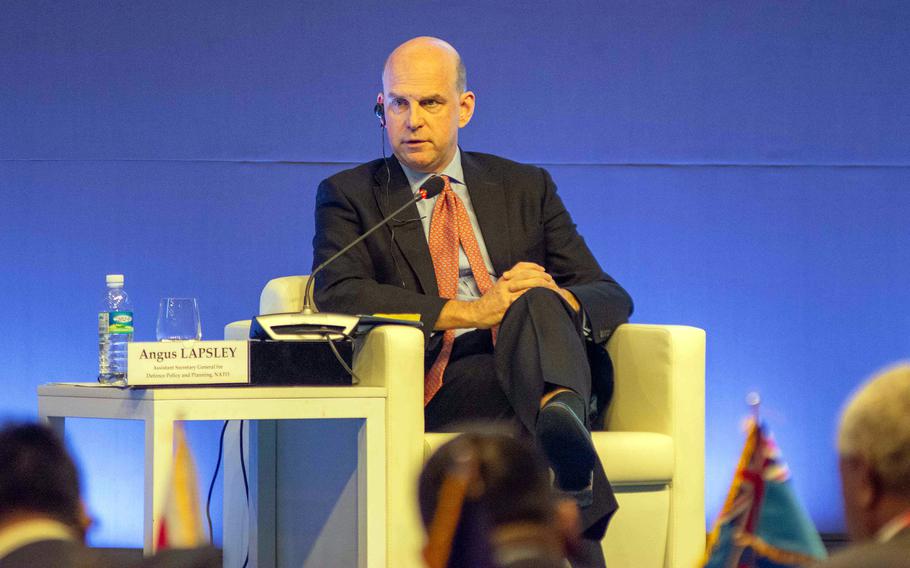
Angus Lapsley, NATO's assistant secretary general for defense policy and planning, discusses North Korea's nuclear threat during the Seoul Defense Dialogue in Seoul, South Korea, Wednesday, Oct. 18, 2023. (Christopher Green/Stars and Stripes)
SEOUL, South Korea — The North Atlantic Treaty Organization’s security is becoming more focused on Asia, particularly South Korea, due to an uptick in threats from Russia and North Korea, a senior NATO official told a defense conference this week.
The alliance’s 31 member states are “deepening our dialogue and engagement” on the Korean Peninsula because “our security is increasingly connected to security here in the Asia-Pacific region,” said Angus Lapsley, NATO’s assistant secretary general for defense policy and planning.
He spoke Wednesday at the 2023 Seoul Defense Dialogue, a military and foreign policy forum hosted by the South Korean Ministry of National Defense.
“I think we, in Europe and North America, absolutely see [North Korea’s] nuclear program as a threat to us and a threat to global security,” Lapsley told an audience of roughly 250 military officials, diplomats and reporters from nearly 60 countries.
North Korea has carried out six underground nuclear tests since 2006 and, according to U.S. and South Korean intelligence agencies, is preparing for a seventh. The communist regime last tested a nuclear device, which it claimed was a hydrogen bomb, on Sept. 3, 2017.
Pyongyang, which is prohibited by the U.N. Security Council from conducting ballistic missile tests, has fired 21 ballistic missiles — four of which were intercontinental ballistic missiles — in 14 separate days of testing so far this year.
NATO, traditionally focused on Russia, is grappling with the challenge posed by a rapid Chinese military buildup and the possibility of conflict in the Taiwan Strait.
In addition to the U.S., other NATO members such as the United Kingdom, Germany and France have sent large military contingents to train in the Indo-Pacific in the past year.
NATO may open a one-person liaison office in Tokyo next year, Japan’s Nikkei newspaper reported May 3. The office will facilitate regular consultations between NATO, Japan and partners in the region such as South Korea, Australia and New Zealand.
NATO’s 2022 Strategic Concept document states that Russia is the most significant threat to Allied security.
However, among other threats it lists “China’s stated ambitions and coercive policies; cyberspace; emerging and disruptive technologies; the erosion of arms control, disarmament and non-proliferation architectures.”
“We are dealing with an increasing number of countries around the world whose regimes are becoming more autocratic, less democratic, more authoritarian and more prepared simply to challenge the rules-based order that we have largely established since 1945,” Lapsley told the conference.
The White House has formally accused North Korea of supplying Russia with munitions for its invasion of Ukraine. Pyongyang shipped Moscow more than 1,000 containers of military equipment and munitions between September and October, National Security Council spokesman John Kirby told reporters Oct. 13.
Lapsley said like-minded nations should address this type of activity by demonstrating that “our deterrence is credible” and calling out “misbehavior … and to do so consistently and coherently together.”
He called an Air Force B-52H Stratofortress’ visit to a South Korean airport on Tuesday “a powerful symbol of how strong our extended deterrence arrangements are.” The touchdown marked the first time a B-52 has landed on the peninsula in at least 30 years.